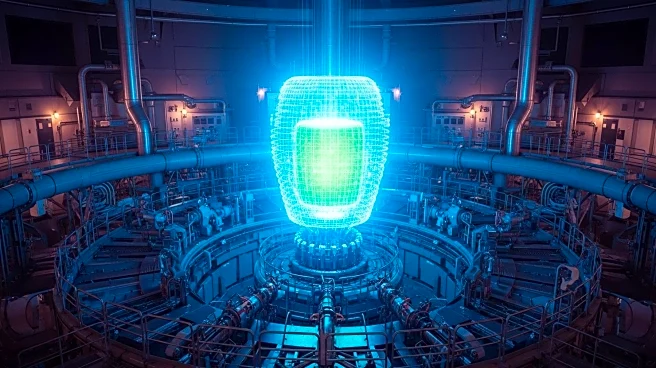What is the story about?
What's Happening?
The U.S. Department of Energy (DOE) has announced the selection of four companies—Oklo Inc., Terrestrial Energy Inc., TRISO-X LLC, and Valar Atomics Inc.—to participate in a new pilot program aimed at building advanced nuclear fuel lines. This initiative is part of the Trump administration's efforts to bolster domestic supply chains for nuclear fuel, thereby reducing reliance on foreign sources of enriched uranium. The selected companies will develop and operate facilities to support various reactor designs, including Oklo's Aurora and Pluto reactors, Terrestrial Energy's fuel salt fabrication process, and TRISO-X's commercial TRISO fuel fabrication facility. The program is designed to ensure a robust supply of fuel for research, development, and demonstration purposes, supporting the DOE's Reactor Pilot Program, which aims to have at least three reactors achieve criticality by July 4, 2026.
Why It's Important?
This development is significant as it represents a strategic move to enhance U.S. energy security and independence. By establishing a domestic supply chain for nuclear fuel, the U.S. can reduce its dependency on foreign uranium sources, which is crucial for national security. The initiative also supports the advancement of nuclear technology, potentially leading to increased private sector investment and a faster path to commercial licensing. This aligns with broader efforts to expand U.S. nuclear capacity, which is vital for meeting the nation's growing demand for reliable and clean energy. The program could also position the U.S. as a leader in nuclear energy innovation, fostering economic growth and technological advancement.
What's Next?
The selected companies will be responsible for the costs associated with the construction, operation, and decommissioning of their facilities. They may apply to receive high-assay low-enriched uranium (HALEU) through the DOE's HALEU Availability Program. The development of these pilot projects is expected to drive private sector investment and create a fast-track approach to commercial licensing. As these projects progress, they will likely attract attention from political leaders, industry stakeholders, and environmental groups, each with vested interests in the outcomes of the nuclear energy sector's expansion.
Beyond the Headlines
The initiative could have long-term implications for the U.S. energy landscape, potentially leading to a renaissance in nuclear power. This shift could influence energy policy, environmental strategies, and economic planning. The ethical and environmental considerations of expanding nuclear energy, such as waste management and safety, will likely be topics of discussion as these projects advance. Additionally, the success of these pilot programs could set a precedent for future government-industry collaborations in other sectors.















